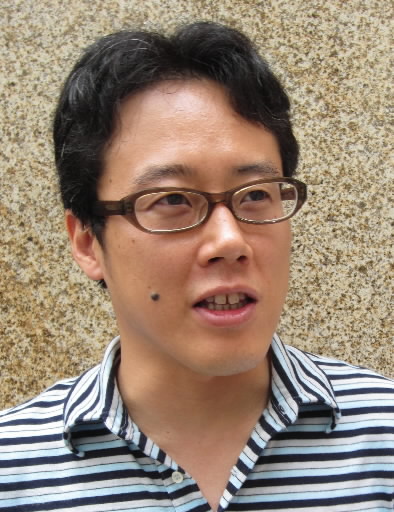Interview with Satoshi Shirai, researcher in the history of social thought
Aug. 22, 2013
The war and Japan
Defeat is ongoing
by Naoki Harada, Editorial Writer
Tomorrow marks the anniversary of the end of World War II. Sixty-eight years have passed since then, but China, South Korea and other countries still judge Japan’s perception of history harshly, and friction has arisen. Why is Japan in this situation? Satoshi Shirai contends that it is because Japan decided to pretend it was not defeated but rather that the war simply ended and has been subordinate to the United States. The Chugoku Shimbun talked to Mr. Shirai, 35, a researcher in the history of social thought and author of “Eizoku haisenron” (The Theory of Permanent Defeat).
What do you mean that defeat is permanent? How has Japan spent the postwar years?
At the end of the occupation, the pre-war ruling class was reinstated to become the leaders of postwar Japan. Because they glossed over their responsibility for the war, it has been impressed on people not that Japan was defeated but that the war simply ended.
And the basic postwar structure was shaped by submitting to the U.S., which accepted and supported that view of history. That is to say, the governing classes of Japan and the U.S. have collaborated in a sort of “make-believe democracy.” In that sense, Japan’s defeat is ongoing. Now Japan is paying the price for that.
So Japan was not reborn as a democracy?
Japan’s system remains basically unchanged from what it was during the war years. It is the same in that it places greater priority on preserving the system than on the security of the people.
What do you mean by that?
Japan embarked on a war it couldn’t win and then prolonged it. Why couldn’t Japan quit? Everyone sensed that Japan was fighting a losing battle, but there was a controlled atmosphere in which people couldn’t speak out. Finally, the atomic bombs were dropped on Japan. The decision to bring the war to an end had more to do with the self-preservation of the establishment than sparing the people from further suffering.
Is this true of Japan’s postwar society as well?
The system for the promotion of nuclear power is a good example. Although the dangers were recognized many times along the way, they were not looked at squarely, and those at the center of power never suggested a fundamental overhaul of the nation’s nuclear energy policy. This ultimately led to the accident at the Fukushima No. 1 (Daiichi) nuclear power plant. But not one of the executives of the Tokyo Electric Power Company has been arrested. They have succeeded in saving their own skins. It’s just like the situation after the war.
But now people’s anger tends to be directed at China and South Korea.
As a result of the high economic growth in the postwar years, Japan held the edge over other Asian countries for a long time, but the global situation has changed. Japan has stagnated and China is on the rise. The two major pillars of the “permanent defeat regime,” the Cold War structure and superiority in Asia, have been lost.
This is the end of Japan’s postwar story of “peace and prosperity.” In particular, the accident at the nuclear power plant revealed the irresponsibility and ineptitude of those at the center of power. Their unwillingness to acknowledge reality nonetheless has appeared in their aggressive attitude toward China and South Korea.
Prime Minister Shinzo Abe’s perception of history has been called into question.
People have tended to think that it’s Asia that has a problem with Japan’s perception of history, but Japan has been criticized by the U.S. as well. It’s only natural because Japan’s understanding of history, which centers on the failure to acknowledge defeat, boils down to an expression of dissatisfaction with the way the U.S. dealt with Japan after the war. That’s why the Abe administration got the cold shoulder when they tried to cozy up to the U.S.
Visits to Yasukuni Shrine by cabinet members have also come under scrutiny.
It’s inevitable that cabinet members will be criticized by China, South Korea and the U.S. if they visit the shrine. They need to recognize that it’s because Class A war criminals are enshrined there. But the real problem is not that they will be criticized by other countries. Those who died on the battlefield, in the A-bombings, in air raids – whose fault is it that they were killed? By rights, the Japanese people themselves should be angry about this, because the politicians who represent us are visiting a shrine where those who are responsible for the war are worshipped as gods.
What should we do now that the postwar period during which we have enjoyed peace and prosperity is coming to an end?
Japan seemed to have made a clean start and become a respectable nation after the war, but it was just an illusion. First of all, we should be enraged about this situation. Look at the position we’ve been driven into by this deception that has been going on for 68 years.
As long as we don’t go back and rethink things, we won’t resolve any of the issues facing Japan, including security and the Trans-Pacific Partnership.
Satoshi Shirai
Native of Tokyo. Holds a doctorate in sociology from Hitotsubashi University. Served as a fellow at the Japan Society for the Promotion of Science before assuming his current post as associate professor at Bunka Gakuen University. Specializes in social thought and political science. Author of several books including “Eizoku haisenron – sengo Nihon no kakushin” (The Theory of Permanent Defeat: The Heart of Postwar Japan), “Mikan no Renin” (Unfinished Lenin), and “‘Busshitsu’ no hoki wo mezashite” (Toward the Uprising of ‘Material Things).
(Originally published on August 14, 2013)








